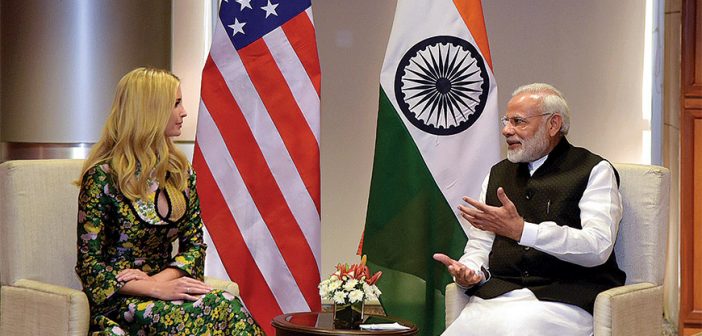The world is undergoing a great transformational change, and so is India. But India is ready for it.
This was the stuff of science fiction when I was growing up in the 1970s and 80s. The event: the inauguration of the eighth edition of the Global Entrepreneurship Summit (GES) in Hyderabad this week. A five-foot tall robot painted in white — I wonder why innovators, otherwise brimming with dashing new ideas, cannot think of a colour other than white for their robots — walked up to Indian Prime Minister Narendra Modi and daughter and adviser to the US President, Ivanka Trump, and pressed their palms against the Indian and the US flags on a screen on Mitra, the robot, to declare the summit open.
This year’s GES, the first to be held in South Asia, has a theme: “Women first, prosperity for all”, which fits in very well with a key thrust area of the Modi government that has paid special attention to women — gas connections to below poverty line families come immediately to mind.
About 1,500 entrepreneurs from 170 countries — more than 50 per cent of whom were women — participated in the three-day summit. The contingent of US participants, at about 350, was the second largest — after, of course, the Indians.
In his opening speech PM Modi invoked ‘Shakti’, the divine power, which emanates from the all-powerful Goddess of power. He further elaborated that modern India celebrates many women super achievers, including Self Employed Women’s Association (SEWA), some of Gujarat’s best known milk cooperatives, and Shri Mahila Griha Udyog Lijjat Papad, which are examples of successful and globally acclaimed women-led co-operative movements.
PM Modi also pointed out that women chief justices are heading three of the four oldest high courts in the country.
These achievements are, and will remain, transformational not only for the women who pioneered them, but also for the society as a whole.
“From your childhood, selling tea to becoming Prime Minister, you have proven that transformational change is possible… and your firm belief that the progress of humanity is incomplete without the empowerment of women…,” said Ivanka Trump, daughter of US President Donald Trump.
Transformational change! Yesterday’s science fiction is today’s reality. What can be more transformational than that?
Take the case of Mitra. It’s a robot developed by Ivento Robotics founded by an Indian — who, some media reports say is the most followed person on Quora. This robot is a huge advertisement for what Modi’s Make in India programme can achieve and the transformational change it can bring about.
Ivento’s Kaundinya Panyam, was quoted as saying: “Mitra is an end-to-end India product … it provides contextual information to customers using a recommendation engine similar to what Facebook and Google use for their services.”
But transformational change — indeed any great change — make people nervous and wary. The changes in the world today have sparked off changes that most people would have considered inconceivable before they actually happened.
It has stoked protectionism and isolationism in the West and extremism elsewhere, disrupting societies and destroying many lives. And as the industrial age steadily makes way for the emerging new digital age, this change will become more brutal, more in-your-face, and more unforgiving — much as the dawn of the industrial age was in the eighteenth and nineteenth centuries for the likes of Ned Ludd and his band of merry men.
We will see before our eyes the death of many high-employment industries. What will replace them? 3D printed cement and homes that can be built in mere 12 hours using that cement?
We don’t know. But what we do suggest is that the world as we know it will change beyond recognition. Driverless cars and drones delivering items for Amazon are already a reality for some people. The possibilities are endless.
Do we resist this change or embrace it and look to the future of human existence?
If this question looks difficult or out of syllabus, as some students say about anything they don’t know or can’t understand, think about the Luddites who fought hard to stave off the industrial revolution.
Would the world have been better off without that revolution? As far as I am concerned— and, I’ll make a guess, about six billion other people — the answer is a resounding no.
We will go through a period of turmoil before settling down to business as usual. In this regard, I think India and Indians are particularly well adapted for survival. But the challenge of jobless growth is here and is an immediate priority for leaders globally to address. Burying heads in the sand is frankly not an option.
Look at the Indian diaspora in Africa… incidentally, my parents were also settled in Africa before they were uprooted from their adopted country and settled in the UK, where they, and thousands of others like them, rebuilt their lives — by sheer dint of entrepreneurial spirit, adaptation to new (initially even hostile) environments, and sheer hard work — and contributed significantly to the economic and social life of Great Britain.
This innate Indian spirit is what gives me an optimist.
Couple this with a government led by Modi that has taken several initiatives — such as Startup India, Make in India and Digital India that allow young and old Indians to dream and give concrete shape to those dreams — and you have the ingredients for a bold new emerging India that is simultaneously exciting and challenging.
It will need an enabling eco-system to thrive. A culture that celebrates efforts (and by definition, failure) as much as success is equally important.
The government has taken several steps to facilitate this, but India is still only at the beginning of the journey.
It’s a long road ahead. And this is where events such as GES can come in handy… by offering a platform to entrepreneurs to exchange ideas and by providing an avenue for them to network with others across the industry value chain to enable them to bring their ideas to market.
Many of us cannot see it yet, as Ned Lud and his ilk couldn’t two hundred years ago, the benefits that can accrue from new innovations that are still on the drawing board, or at best, at the beta stage.
But that will not stop me from dreaming about a much brighter, tech-enabled future for all.
Disclaimer: The views expressed in the article above are those of the authors’ and do not necessarily represent or reflect the views of this publishing house. Unless otherwise noted, the author is writing in his/her personal capacity. They are not intended and should not be thought to represent official ideas, attitudes, or policies of any agency or institution.







